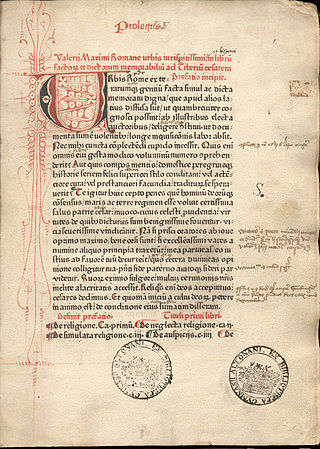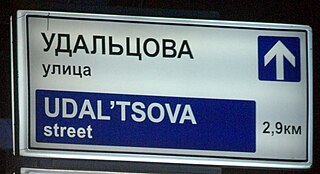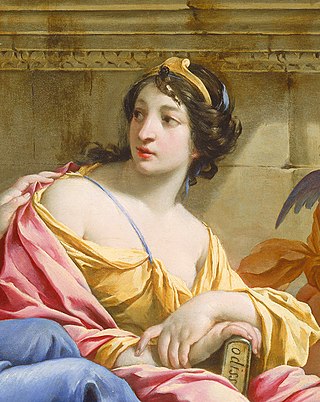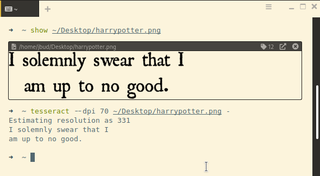
Dante Alighieri, most likely baptized Durante di Alighiero degli Alighieri and often referred to as Dante, was an Italian poet, writer, and philosopher. His Divine Comedy, originally called Comedìa and later christened Divina by Giovanni Boccaccio, is widely considered one of the most important poems of the Middle Ages and the greatest literary work in the Italian language.

An incunable or incunabulum is a book, pamphlet, or broadside that was printed in the earliest stages of printing in Europe, up to the year 1500. Incunabula were produced before the printing press became widespread on the continent and are distinct from manuscripts, which are documents written by hand. Some authorities on the history of printing include block books from the same time period as incunabula, whereas others limit the term to works printed using movable type.

Latin is a classical language belonging to the Italic branch of the Indo-European languages. Considered a dead language, Latin was originally spoken in Latium, the lower Tiber area around Rome. Through the expansion of the Roman Republic it became the dominant language in the Italian Peninsula and subsequently throughout the Roman Empire. Even after the fall of Western Rome, Latin remained the common language of international communication, science, scholarship and academia in Europe until well into the early 19th century, when regional vernaculars supplanted it in common academic and political usage—including its own descendants, the Romance languages. For most of the time it was used, it would be considered a dead language in the modern linguistic definition; that is, it lacked native speakers, despite being used extensively and actively.

A manuscript was, traditionally, any document written by hand or typewritten, as opposed to mechanically printed or reproduced in some indirect or automated way. More recently, the term has come to be understood to further include any written, typed, or word-processed copy of an author's work, as distinguished from the rendition as a printed version of the same.

The Nicene Creed, also called the Creed of Constantinople, is the defining statement of belief of Nicene or mainstream Christianity and in those Christian denominations that adhere to it. The original Nicene Creed was first adopted at the First Council of Nicaea in 325. In 381, it was amended at the First Council of Constantinople. The amended form is also referred to as the Nicene Creed, or the Niceno-Constantinopolitan Creed for disambiguation.
Project Gutenberg (PG) is a volunteer effort to digitize and archive cultural works, as well as to "encourage the creation and distribution of eBooks." It was founded in 1971 by American writer Michael S. Hart and is the oldest digital library. Most of the items in its collection are the full texts of books or individual stories in the public domain. All files can be accessed for free under an open format layout, available on almost any computer. As of 13 February 2024, Project Gutenberg had reached 70,000 items in its collection of free eBooks.

The Vulgate, sometimes referred to as the Latin Vulgate, is a late-4th-century Latin translation of the Bible.

The Voynich manuscript is an illustrated codex, hand-written in an unknown script referred to as 'Voynichese.' The vellum on which it is written has been carbon-dated to the early 15th century (1404–1438). Stylistic analysis has indicated the manuscript may have been composed in Italy during the Italian Renaissance. While the origins, authorship, and purpose of the manuscript are still debated, hypotheses range from a script for a natural language or constructed language, an unread code, cypher, or other form of cryptography, or perhaps a hoax, reference work, or work of fiction currently lacking the translation(s) and context needed to both properly entertain or eliminate any of these possibilities.

Astraea, Astrea, Astria or Austräa, in ancient Greek religion, is a daughter of Astraeus and Eos. She is the virgin goddess of justice, innocence, purity and precision. She is closely associated with the Greek goddess of justice, Dike. She is not to be confused with Asteria, the goddess of the stars and the daughter of Coeus and Phoebe. The main belt asteroid 5 Astraea is named after her, and her name was also suggested for the planet Uranus.

The Internet Archive is an American nonprofit digital library founded in 1996 by Brewster Kahle. It provides free access to collections of digitized materials including websites, software applications, music, audiovisual and print materials. The Archive also advocates for a free and open Internet. As of February 4, 2024, the Internet Archive held more than 44 million print materials, 10.6 million videos, 1 million software programs, 15 million audio files, 4.8 million images, 255,000 concerts, and over 835 billion web pages in its Wayback Machine. Its mission is committing to provide "universal access to all knowledge".
The Perseus Digital Library, formerly known as the Perseus Project, is a free-access digital library founded by Gregory Crane in 1987 and hosted by the Department of Classical Studies of Tufts University. One of the pioneers of digital libraries, its self-proclaimed mission is to make the full record of humanity available to everyone. While originally focused on the ancient Greco-Roman world, it has since diversified and offers materials in Arabic, Germanic, English Renaissance literature, 19th century American documents and Italian poetry in Latin, and has sprouted several child projects and international cooperation. The current version, Perseus 4.0, is also known as the Perseus Hopper, and is mirrored by the University of Chicago.

JSTOR is a digital library of academic journals, books, and primary sources founded in 1994. Originally containing digitized back issues of academic journals, it now encompasses books and other primary sources as well as current issues of journals in the humanities and social sciences. It provides full-text searches of almost 2,000 journals. Most access is by subscription but some of the site is public domain, and open access content is available free of charge.

Ecclesiastical Latin, also called Church Latin or Liturgical Latin, is a form of Latin developed to discuss Christian thought in Late antiquity and used in Christian liturgy, theology, and church administration to the present day, especially in the Catholic Church. It includes words from Vulgar Latin and Classical Latin re-purposed with Christian meaning. It is less stylized and rigid in form than Classical Latin, sharing vocabulary, forms, and syntax, while at the same time incorporating informal elements which had always been with the language but which were excluded by the literary authors of Classical Latin.

The romanization of the Russian language, aside from its primary use for including Russian names and words in text written in a Latin alphabet, is also essential for computer users to input Russian text who either do not have a keyboard or word processor set up for inputting Cyrillic, or else are not capable of typing rapidly using a native Russian keyboard layout (JCUKEN). In the latter case, they would type using a system of transliteration fitted for their keyboard layout, such as for English QWERTY keyboards, and then use an automated tool to convert the text into Cyrillic.

In Greek mythology, Calliope is the Muse who presides over eloquence and epic poetry; so called from the ecstatic harmony of her voice. Hesiod and Ovid called her the "Chief of all Muses".

Google Books is a service from Google that searches the full text of books and magazines that Google has scanned, converted to text using optical character recognition (OCR), and stored in its digital database. Books are provided either by publishers and authors through the Google Books Partner Program, or by Google's library partners through the Library Project. Additionally, Google has partnered with a number of magazine publishers to digitize their archives.

Tesseract is an optical character recognition engine for various operating systems. It is free software, released under the Apache License. Originally developed by Hewlett-Packard as proprietary software in the 1980s, it was released as open source in 2005 and development was sponsored by Google in 2006.
Hugh Sottovagina, often referred to as Hugh the Chanter or Hugh the Chantor, was a historian for York Minster during the 12th century and was probably an archdeacon during the time of his writing. He was the author of the Latin text known as the History of the Church of York.

The British Library is a research library in London that is the national library of the United Kingdom. It is one of the largest libraries in the world. It is estimated to contain between 170 and 200 million items from many countries. As a legal deposit library, the British Library receives copies of all books produced in the United Kingdom and Ireland, including a significant proportion of overseas titles distributed in the UK. The Library is a non-departmental public body sponsored by the Department for Culture, Media and Sport.

The Sixto-Clementine Vulgate or Clementine Vulgate is an edition of the Latin Vulgate, the official Bible of the Roman Catholic Church. It was the second edition of the Vulgate to be formally authorized by the Catholic Church, the first being the Sixtine Vulgate. The Clementine Vulgate was promulgated in 1592 by Pope Clement VIII, hence its name. The Sixto-Clementine Vulgate was used officially in the Catholic Church until 1979, when the Nova Vulgata was promulgated by Pope John Paul II. The Clementine Vulgate is still in use in the 1962 missal and breviary of the Catholic Church.















